AI phone agents can take customer service calls, cold-call leads, and pass information to your team. Some top AI phone agent platforms include Lindy.ai, which is the best overall, Bland is for enterprises, and Synthflow is for AI call centers.
Read on to learn more about:
- What AI phone agents are and how they’ve evolved
- Key features and benefits of AI phone platform
- Challenges and considerations
- Our top 5 phone AI platforms, their features, intended users, and pricing
- Why you should pick Lindy to be your AI phone agent
The evolution of AI phone agents
AI phone agents have come a long way from their early roots in traditional IVR (Interactive Voice Response) systems. We all remember those rigid, tinny-sounding systems that struggled to understand you.
Luckily for everyone, conversational AI emerged, powered by natural language understanding (NLU) and large language models like GPT-4. With these advancements, phone agents can now understand intent, context, tone, and sentiment. This results in more human-like conversations, where you feel like speaking with a capable, empathetic assistant.
Currently, larger enterprises and scrappy startups alike are deploying AI call center agents. These platforms help companies reduce support costs, shorten wait times, and improve customer satisfaction.
What are AI phone agents?
AI phone agents are voice-based systems that handle inbound and outbound calls autonomously — no humans required. They can execute a wide range of tasks, like:
- They take customer service calls and guide (sometimes disgruntled) customers through problems. They create customer support tickets to organize cases, and they can hand customers over to a real human agent if they detect a problem that is too complex to solve.
- Cold-calling to find potential customers, gather information, qualify leads, and schedule meetings with your human sales reps.
- Appointment confirmation or scheduling changes for dentists, medical offices (as long as they use a HIPAA-compliant platform), salons, and other services.
- Conduct surveys, opinion polls, and other phone-based campaigns that require executing 10,000s of calls.
AI phone agents are similar to people, differing slightly in just a few tonal areas. They can understand and process what humans say on the other end of the line and usually provide answers and guidance to most questions.
How do AI phone agents work?
When a customer speaks, the phone agent uses a speech-to-text model that converts the customer's speech to text in real time. It can effectively comprehend various accents and speech patterns while filtering out background noise, ensuring clear understanding.
The AI phone agent then sends each transcription to a large language model, such as ChatGPT-4, Claude 3.5 Sonnet, or others, to understand the customer’s meaning and intent. Once it understands the customer, it uses a knowledge base to formulate a response.
Add a knowledge base about your business
A knowledge base is like an information warehouse. Your agents will use it to formulate all their responses to customers, leads, survey respondents, and others on the other end of the line.
You will construct your knowledge base using company resources, including data, training materials, FAQs, blog posts, and other references related to your business, products, or services. The language model searches your knowledge base for the best available match, so monitoring your knowledge base’s accuracy and regularly refining content is essential.
Now, your AI agent responds to the customer using a text-to-speech model. This converts your agent’s response into natural-sounding speech that maintains a consistent tone.
Key features of AI phone agents
Adopting AI call center agents, or customer service and cold calling agents, comes with many benefits. Here are the key functionalities you’ll get with a high-quality AI phone platform:
- Sentiment detection: AI phone agents can analyze a caller’s tone of voice, word choice, and speech patterns to estimate their emotional state. This enables the agent to adapt its responses — like showing empathy during a complaint, maintaining enthusiasm in sales conversations, or sensing frustration and routing the caller to a human agent if necessary.
- Integration capabilities: A high-quality AI phone platform seamlessly integrates with your existing tech stack. This includes plugging into CRMs like HubSpot and Salesforce, scheduling tools like Google Calendar and Calendly, databases, and more. Your agent will transfer data directly from each call to these destinations, simplifying information storage and access and easily setting up meetings with human sales or service reps.
- Create documents: AI phone agents can automatically generate summaries, meeting notes, support tickets, or contracts during or after a call, all based on the conversation’s content. These generated documents can be instantly synced with your preferred platforms like Google Docs, Notion, or your internal CRM.
- Multi-language support: Most AI phone platforms offer multi-language capabilities. For instance, Lindy is fluent in over 30 languages, so it can engage callers from several parts of the globe. These agents can also automatically detect a caller’s language and switch seamlessly, responding with native-level fluency across dozens of supported languages.
- Consistency at scale: AI phone agents are designed to handle many calls simultaneously, a capability far beyond human agents. This scalability ensures operations can manage peak volumes without compromising response times or quality, which helps during high-demand periods like product launches or sales events.
Benefits of implementing AI phone agents
Now that we’ve established that AI phone agents can execute many tasks similar to human agents, while making information accessible to your entire organization and even creating documents, let's look at some of the main benefits that these platforms offer:
- 24/7 support: AI phone agents never tire. They work around the clock, qualifying leads or ensuring that customers get the help they need, no matter the time zone.
- Consistent productivity: No matter how redundant the work is, AI phone assistants give every customer, lead, or survey respondent the same level of service — burnout is out of the question. AI agents also glean data and information from every interaction, automatically storing it for safekeeping and easy retrieval without manual data entry.
- Cost reduction: AI phone agents significantly reduce operational costs by automating tasks that would otherwise require large human teams, such as answering FAQs, routing calls, scheduling appointments, or logging tickets. You also won’t need to devote resources to hiring and training.
Best practices when adopting an AI phone agent platform
Convinced that you want to implement and AI phone agent platform into your operations? It’s probably an ideal choice. Here are some best practices to execute when you onboard your own AI phone agent system:
1. Define objectives
First, clearly define what you want the system to accomplish. For instance, are you aiming to reduce wait times, automate outbound lead generation, qualify inbound support inquiries, or all of the above?
By outlining your primary goals early, you create a focused roadmap that shapes how you build, configure, and train your AI call center agents. Then, determine how AI agents can help each separate team within your company. Do this by getting their feedback.
For instance, your support team may wish to prioritize fast resolutions, while your sales team might care more about lead qualification and appointment scheduling.
Knowing these distinctions allows you to tailor your agent workflows, knowledge base content, and integrations accordingly — ensuring your AI phone agent supports everyone’s KPIs.
2. Choose the right platform
With your core objectives in hand, find a system that aligns with them. Then, think about ease of use — many AI phone agent platforms don’t require coding skills to create agents, but others do. Assess your team’s technical abilities to determine which kind of platform you want.
Take note of all the software systems you currently use: This includes your CRM platform, collaboration platforms like Google Docs and Google Calendar, your database providers, and others. Ensure that the phone agent platform of choice integrates with these so that syncing data is a cinch.
Importantly, don’t overlook compliance. If you’re saving customer data, you’ll need SOC 2 compliance, and if you’re a medical business dealing with sensitive patient data, HIPAA compliance is an absolute must.
3. Choose an LLM and create your knowledge base
As we mentioned, the knowledge base serves as your agent’s memory bank — it will be the source of all the answers and responses that your agent provides. This means your AI phone agent is only as effective as the knowledge it can access.
Thus, building a robust, well-organized knowledge base is one of the most critical steps in your setup. Include necessary product documentation, FAQs, pricing info, onboarding guides, support workflows, and anything else you’d expect a human rep to reference in conversation.
Some platforms, like Lindy, also allow you to select an LLM for your phone. If you have a complex product or service, apply one of the more advanced LLMs, like GPT-4 Turbo, GPT-4o, or Claude 3.5 Sonnet.
These models tend to offer better contextual understanding and can handle more complex conversations, though they do have higher usage costs.
4. Testing
After configuring your agent and knowledge base, it’s testing time. This is where you’ll evaluate voice clarity, intent recognition, conversation flow, objection handling, and how well it aligns with your brand’s tone.
First, run internal test calls in which team members act as leads or customers, simulating various scenarios, from frequently asked questions to edge cases and emotionally charged conversations.
Use these sessions to identify how well your AI call center agent interprets speech, handles pauses, and responds to unexpected inputs. Also, test the accuracy of knowledge base retrieval: Does the AI find the right answer quickly or default to vague or unhelpful replies?
After you’ve ironed everything out, ease into deployment with a phased rollout. For instance, start with simple calls on a small subset of leads. Monitor each call closely and implement changes often. When your methods start to hit, you can scale up gradually, minimizing risk.
5. Continuous monitoring and optimization
Once your AI agent is up and running, your work is far from complete. Continue to review calls, transcripts, and analytics dashboards to ensure your phone agent continues to represent your business in the best possible way.
Whenever you update your products or services, it’s of the utmost importance that you also update your knowledge base — an agent that provides outdated information is a recipe for disaster.
5 top AI phone agent platforms in 2025
1. Lindy.ai: The best overall
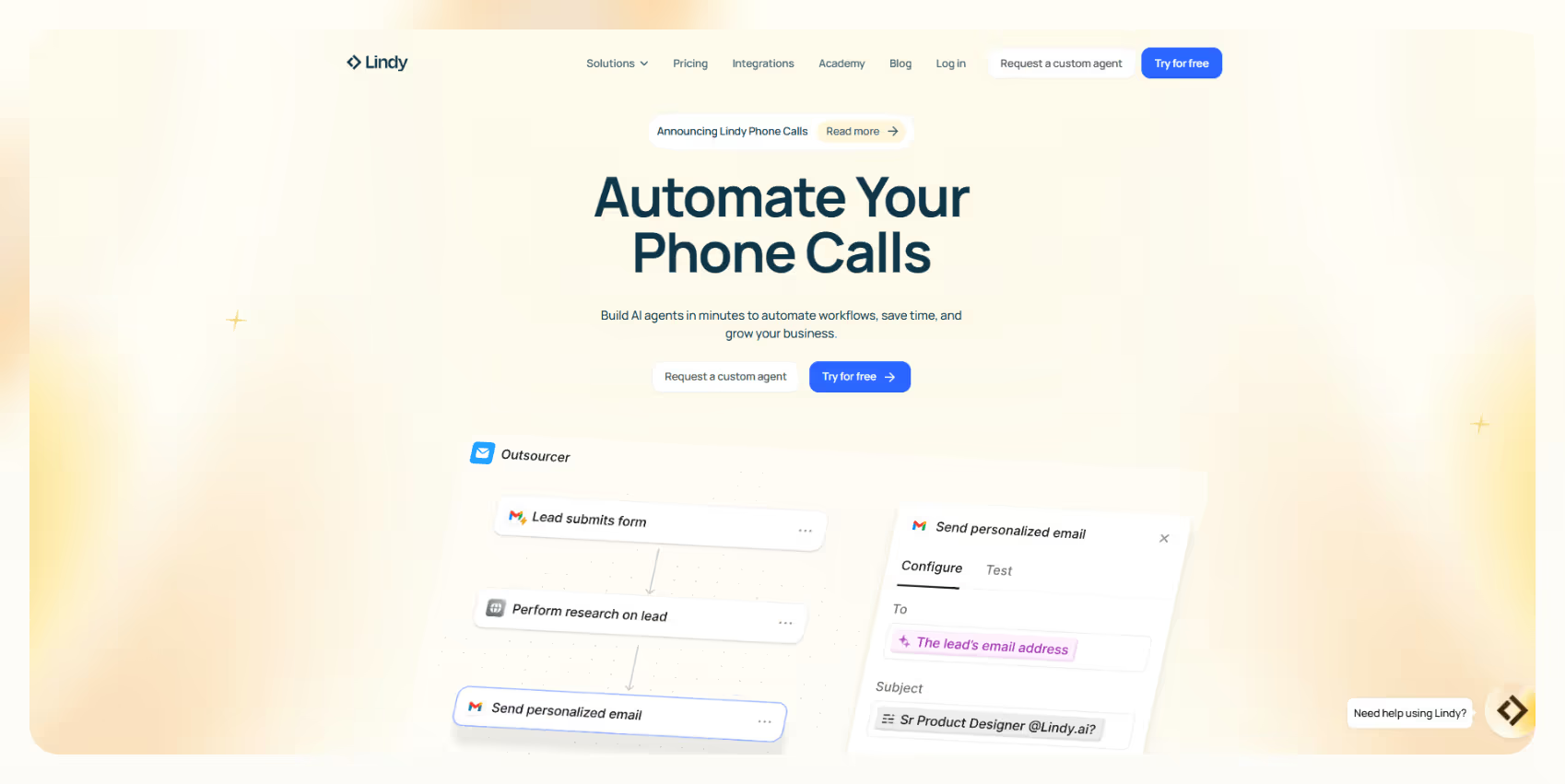
Lindy is an AI agent-building platform, and building phone agents is just one of its abilities. It offers loads of premade templates and a no-code building interface.
Features
- Inbound & outbound handling: Lindy supports full voice automation for both incoming and outgoing calls. Agents can qualify leads, answer support questions, route callers to humans, or complete post-call tasks like documenting transcripts or syncing with CRMs like HubSpot or Salesforce.
- Post-call automations and multi-agent collaboration: After each interaction, Lindy can create documents, notify teams via Slack, log data into Google Sheets or CRMs, and collaborate with other AI agents in your workflow.
- Pick your own LLM: If you have a complex product or service, Lindy allows you to choose a model, like Claude 3.5 Sonnet, ChatGPT-o3 that can give you advanced reasoning skills.
Ideal users
Lindy is ideal for teams of any size — from entrepreneurs just starting out to established enterprises.
Pricing
Lindy has two plans: The lowest for $49/month and highest for $299/month. Phone pricing is $10/phone number, with per-minute rates that vary based on the call destination.
The Verdict
Because of its ease of use, flexibility, and capability to make powerful phone agents that you can execute a variety of tasks, Lindy is our favorite overall AI phone agent platform.
{{templates}}
2. Bland AI: An enterprise AI phone agent
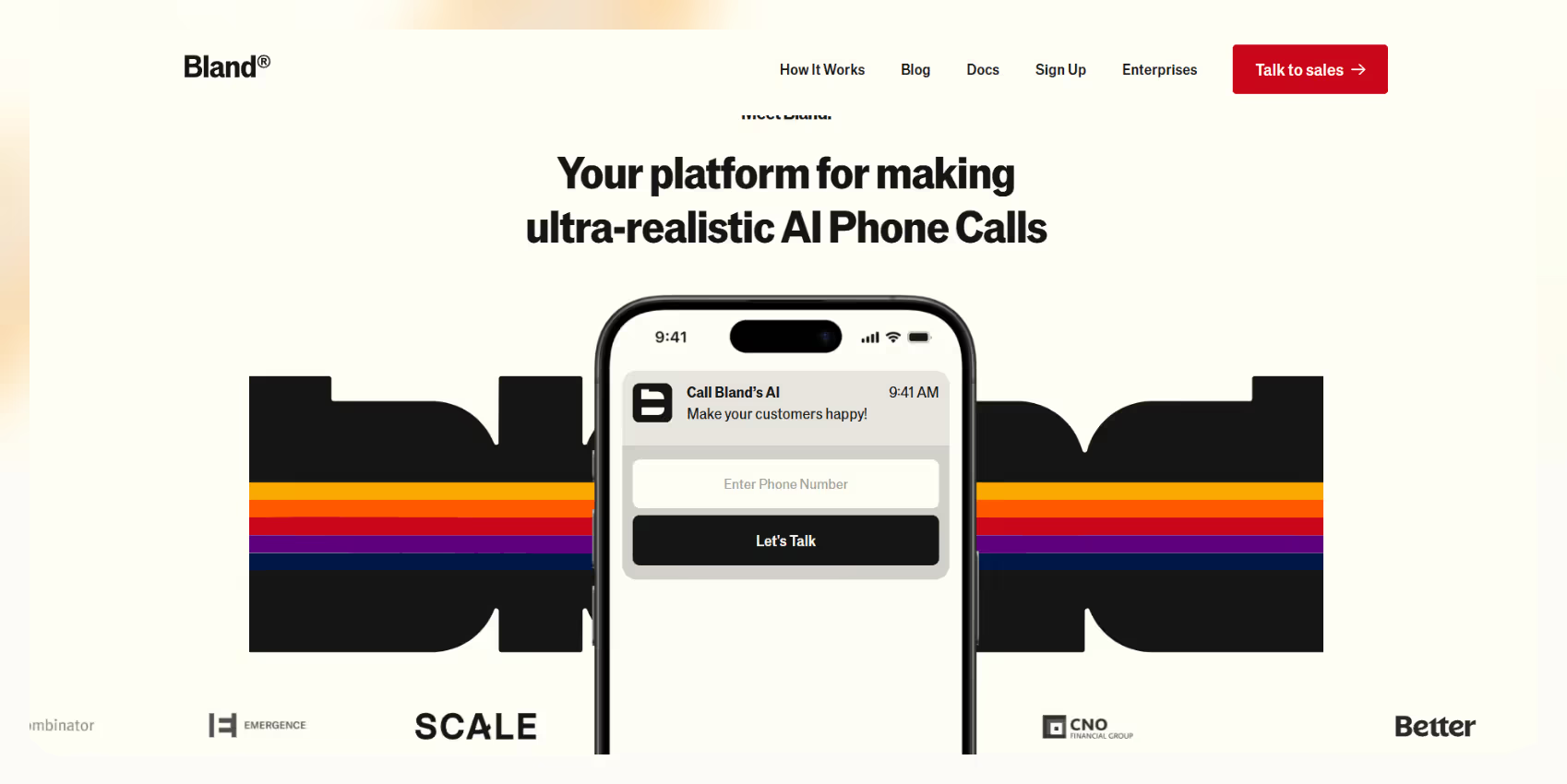
Bland is an enterprise-level AI platform for automating phone calls using conversational AI. It is ideal for handling tasks such as sales, scheduling, and customer support.
Features
- Scalability: Bland AI supports scaling, which works well for enterprises. It can handle an increase in call volume effortlessly without compromising the quality of service.
- Integrations: The system integrates seamlessly with existing business infrastructure, such as CRMs and ERPs like Zoho, HubSpot, and Odoo ERP, allowing customized workflows and actions.
Ideal users
The platform is ideally suited for large enterprises that require high-volume phone interaction capabilities, such as call centers, customer service departments, and sales teams.
Pricing
Bland doesn’t publish its pricing, so you’ll need to contact their sales team for more information.
The Verdict
With powerful integrations and the ability to scale your agents to meet high call volumes, Bland is ideal for large organizations. Yet, it’s probably too expensive for smaller and even medium-sized organizations.
3. Synthflow AI: For businesses of all sizes
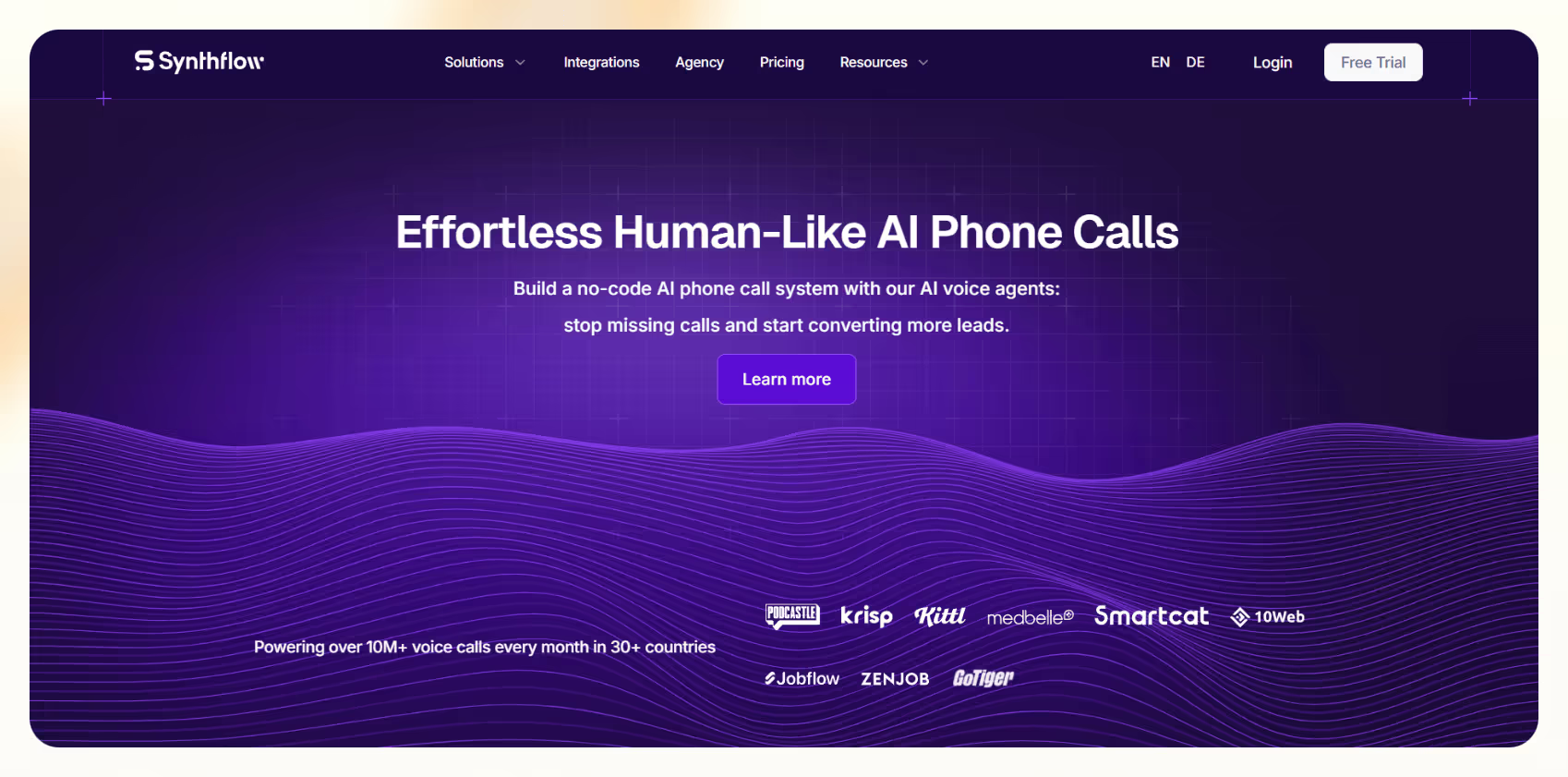
Synthflow AI is a no-code platform for creating and deploying AI voice assistants to automate customer interactions.
Features
- No-code AI voice assistant creation: Synthflow AI's intuitive interface allows users to design and deploy AI voice assistants without any coding knowledge, allowing anyone on your team to create AI phone agents.
- Multilingual support: By supporting over 20 languages, Synthflow AI enables businesses to cater to a diverse, global customer base.
- Premade workflows: Launch your agents fast with read-to-go workflows for real-time booking, human call transfers, and voicemail detection tasks.
Ideal users
The platform is an excellent solution for businesses of any sizes that need various voice agents, for handling customer service tasks, cold calling, and more.
Pricing
Start using Synthflow for only $29/month, and get 50 minutes of total call time and up to 5 concurrent calls. The next version, at $450/month, provides up to 2,000 minutes of call time and 25 concurrent calls.
The Verdict
While it provides a bundle of minutes that allows you to budget your time, Synthflow is rigidly priced, with its second tier being over $400 more than the first.
4. Vapi: For creating no-code agents powered by APIs
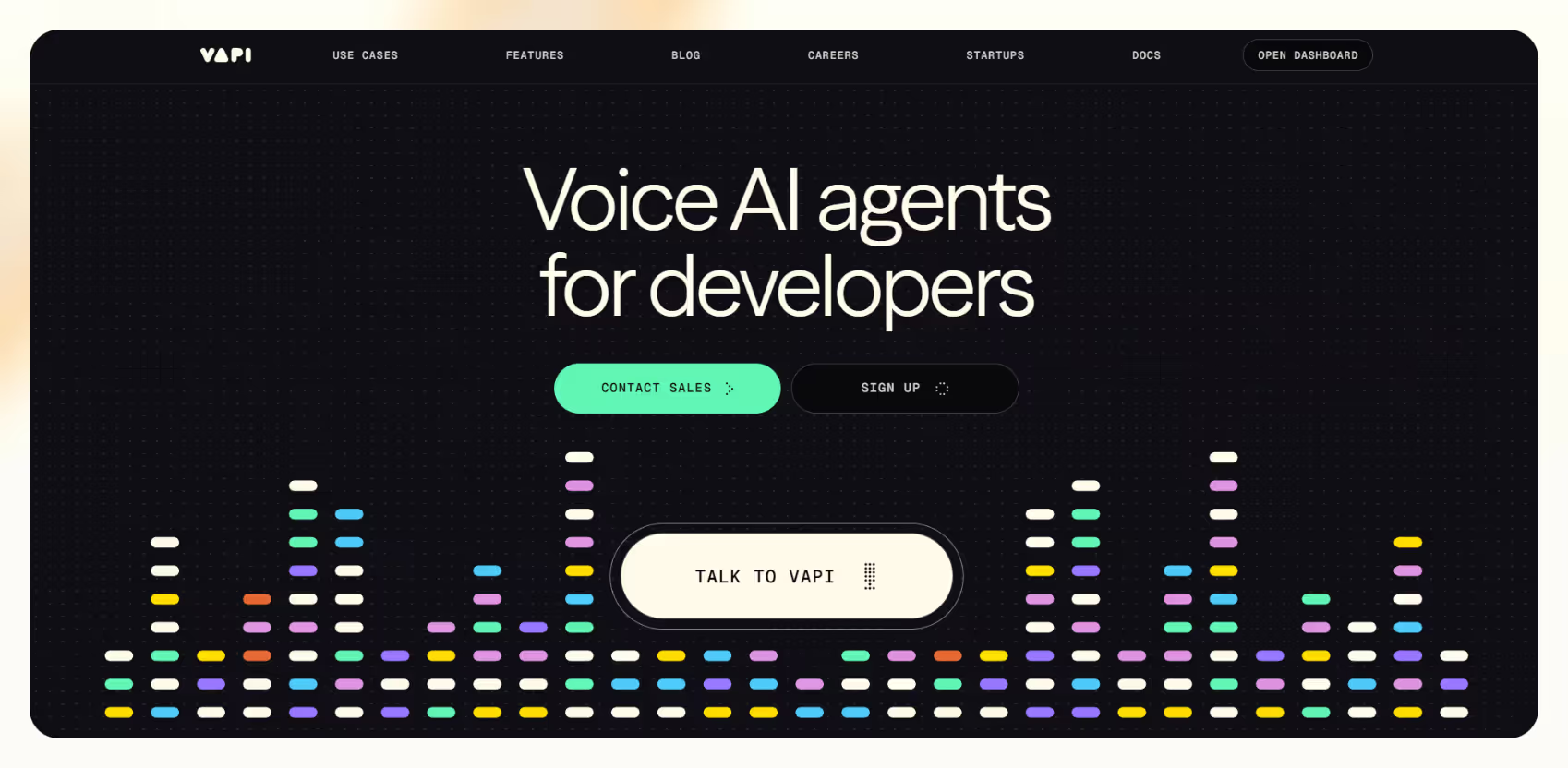
Vapi AI is a no-code phone agent platform that also leverages developer-focused features. It allows techies to create customized voice agents capable of handling both inbound and outbound phone calls.
Features
- API’s galore: Vapi is built with developers in mind, and its API-first architecture is one of its standout strengths. If you're looking to customize your voice agent experience deeply, Vapi gives you robust API access that allows you to trigger integrations programmatically, inject custom data into calls (such as CRM info), and much more.
- HIPAA-compliant: You can build voice agents for your healthcare business to handle sensitive medical data.
Ideal users
While you’ll be able to create simple agents with Vapi using the no-code feature, the platform is more suited for developers, who can programmatically craft unique agents using code.
Pricing
Although the starting price is $0.05/minute, Vapi pricing is quite complicated. Your costs will depend on the different language models you select, the number of calls you receive, and the destination or location for each outbound or inbound call.
The Verdict
Vapi allows you to build custom-crafted agents, but to really squeeze the juice out of the platform, you’ll need to be a developer.
5. Ringly: Best for e-commerce companies
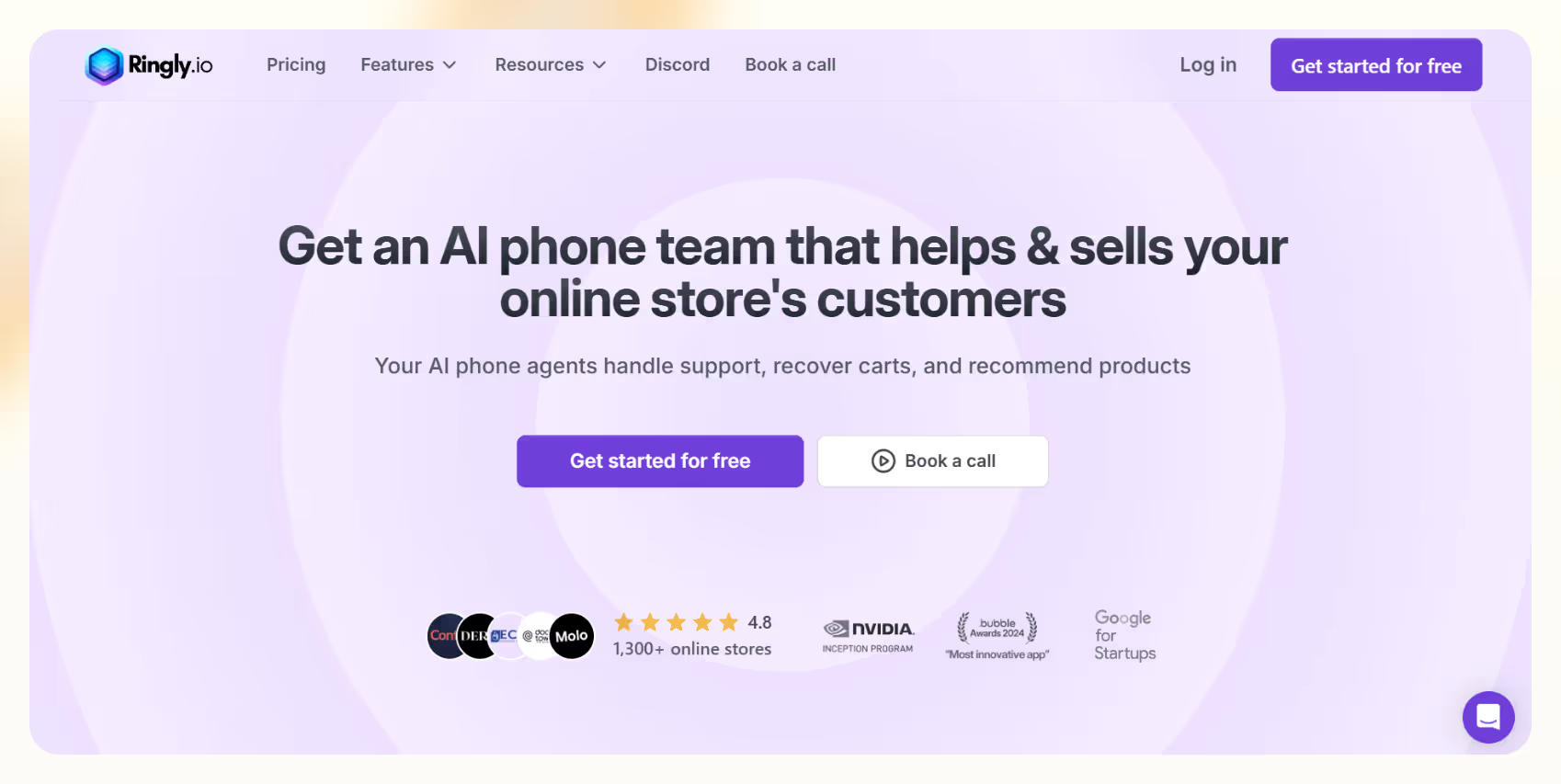
Ringly lets you build AI phone and text message agents to automate interactions with your e-commerce customers.
Features
- Cart recovery: Ringly.io's AI agents can contact customers who have abandoned their shopping carts by making outbound calls or sending messages, addressing any concerns or questions.
- Order status checks: Customers can inquire about their order statuses directly by calling an AI agent, which can access and provide real-time updates during the call.
Ideal users
Ringly is mainly catered to e-commerce businesses of all sizes, looking to streamline their customer support in one easy place.
Pricing
Build unlimited agents and get a free phone number for only $21/month, with 60 minutes of total call time — get an extra 30 minutes for an extra $8. The $69/month version gets you unlimited agents, 155 minutes of call time, and 3 free phone numbers.
The Verdict
While a great tool for handling inbound calls for your e-commerce business, you might want to check out other platforms if you’re not in the e-commerce industry.
Frequently asked questions
What are AI phone agents?
AI phone agents are virtual assistants powered by artificial intelligence designed to handle phone interactions, such as answering calls, providing information, and performing tasks like scheduling appointments.
How do AI phone agents work?
They utilize speech recognition and natural language processing technologies to understand and respond to caller inquiries, enabling natural and efficient conversations.
Can AI phone agents handle multiple languages?
Yes, many AI phone agents support multiple languages, allowing you to cater to a diverse customer base. For instance, platforms like Lindy support over 30 languages, allowing you to reach clients on several continents.
What is the cost of implementing an AI phone agent?
Usually, you’ll need to pay a subscription fee and phone charges. Lindy, for instance, charges $10/phone number, along with rate costs depending on where you call. On the other hand, Vapi has a different pricing structure, including phone numbers, type of LLM used, call durations, and a few other factors.
{{cta}}
Lindy: Your versatile AI phone agent
Lindy is a powerful AI phone agent with conversational AI designed for flexibility and adaptation.
But Lindy isn’t limited to any singular phone agent task — Lindy can make cold calls to leads, take customer service inquiries, conduct consumer satisfaction surveys, and execute other phone tasks.
Here’s how easy it is to make Lindy your agent:
- Pre-made outbound voice agents: Build your own cold-calling AI phone agents with this template and reach out to leads in a snap — and the best thing is, you won’t need to use any programming skills. You’ll harness the power of Lindy’s simple no-code visual editor.
- A team player: After contacting a lead, Lindy takes notes and encourages each lead to set up a meeting with one of your sales reps.
- Handle your scheduling: Need to contact clients and colleagues to set up appointments, meetings, or just a quick catch-up over coffee? Have Lindy do it for you. Tell Lindy your schedule and who to contact, and it will reach out to everyone, updating your calendar as it makes plans.
- A cosmopolitan: If you’re a multinational company, Lindy’s a great fit. It speaks over 30 languages, allowing you to serve customers or find new ones all across the globe.
Ready to build your own AI phone agents without writing a single line of code? Create your first Lindy today for free.



















.jpg)
.png)
.png)

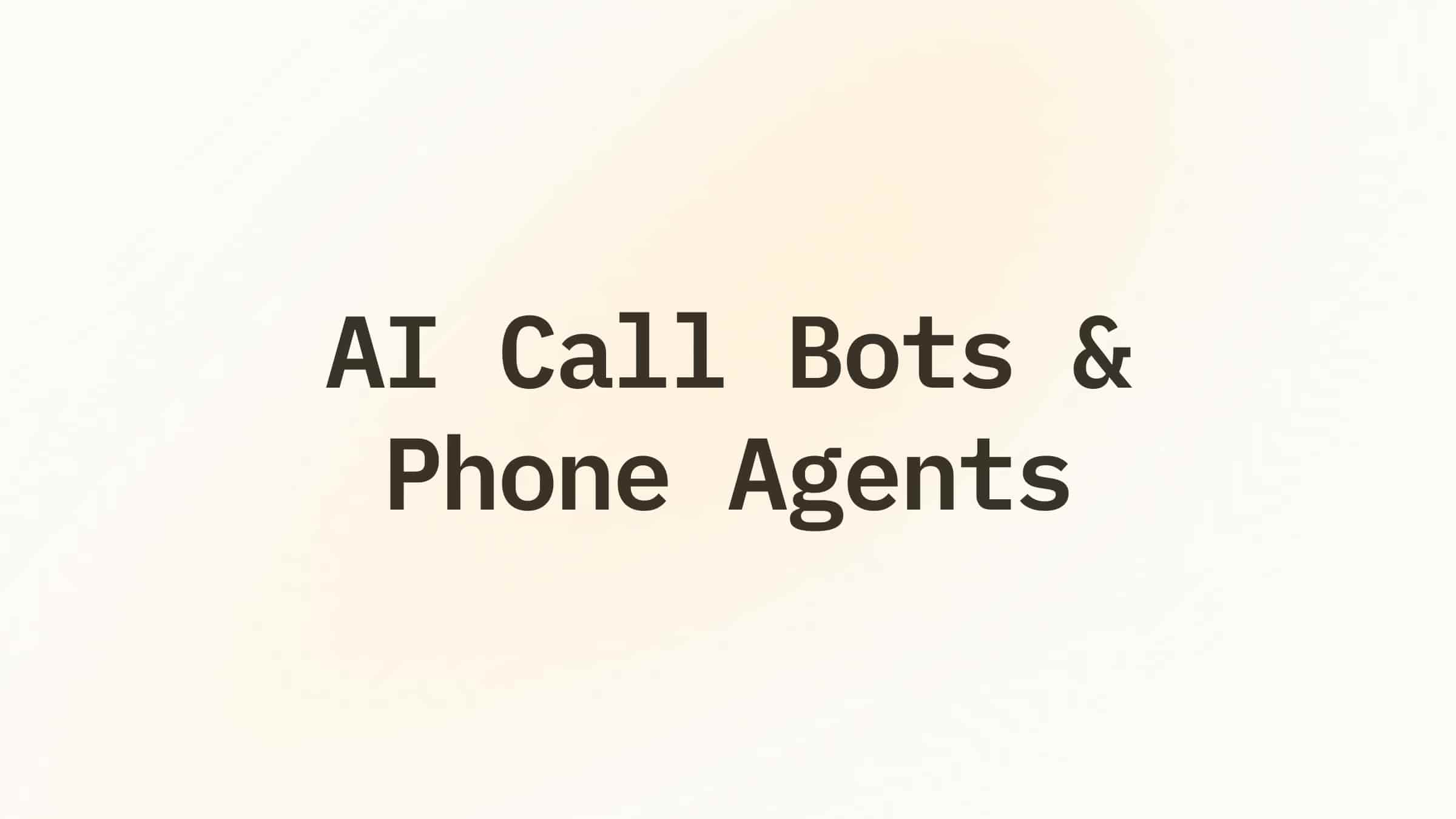
.png)
.png)